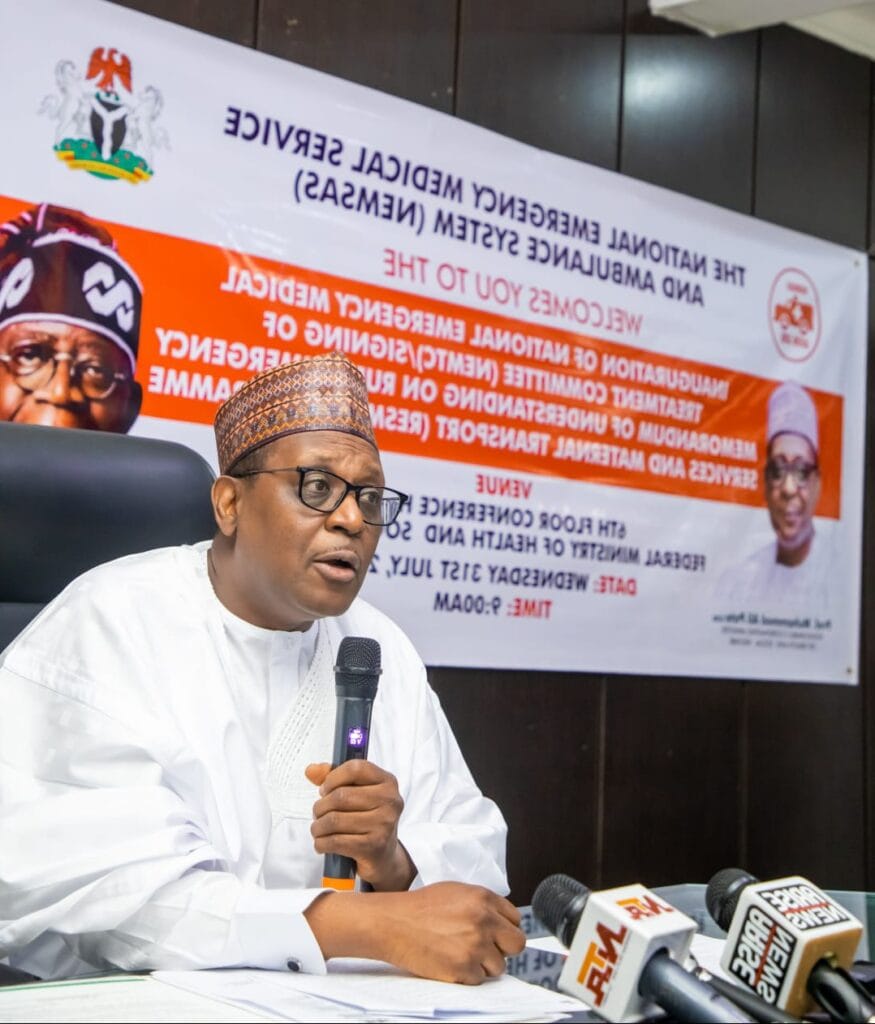….Inaugurates National Emergency Medical Treatment Committee members
From Atiku Sarki, Abuja
The Coordinating Minister of Health and Social Welfare, Prof. Muhammad Ali Pate, CON has observed that the lack of comprehensive emergency services has contributed substantially to crude mortality rates. especially maternal and child mortality which he said remain high in Nigeria.
In a statement signed and issued to newsmen on Wednesday in Abuja by the Assistant Director, of Information the Public Relations in the ministry, Ado Bako said Prof. Pate, made this assertion while inaugurating members of the National Emergency Medical Treatment Committee (NEMTC), in Abuja.
According to the Minister “Nigeria accounts for a staggering one in every four global maternal deaths, this harrowing statistic implies that a pregnant woman in Nigeria faces a 1 in 21 chance of succumbing to pregnancy and childbirth-related complications, contrasting sharply with the global average of 1 in 190 (World Health Organization, 2020). Timely, appropriate, effective and efficient emergency medical responses can reduce these abysmal statistics, which is an essential element to achieving Universal Health Coverage (UHC) by responding to a range of acute conditions in children and adults, including injuries, infections, acute exacerbations of non-communicable diseases, and complications of pregnancy.”
The Minister estimated that every year, Nigeria has about 7 million pregnancies with an estimated 9%, developing complications mostly in the rural areas. He stressed that the provision of adequate pre-hospital and in-hospital emergency care and referral systems between Basic Emergency Obstetric and New Born (BEMONC) and CEMONC health facilities as well as ensuring financial risk protection for pregnant women in rural settings where a majority of maternal mortalities are recorded, can help reduce our poor indices and improve health outcomes.
“This administration under the leadership of President Bola Ahmed Tinubu, GCFR, has streamlined the focus of NEMTC through NEMSAS by prioritizing emergency services for rural dwellers through Rural Emergency Service and Maternal Transport (RESMAT) which is a sub-set of NEMSAS”, he further stated.
Pate described the job of the National Emergency Medical Treatment Committee as important and should be handled as such, adding that it is integral to this administration’s goal for the health sector codified in the Nigeria Health Sector Renewal Investment Initiative.
According to the Minister, the task of the NEMTC is to approve the NEMSAS work plan for the administration of the stipulated 5% of the Basic Health Care Provision Fund; Provide periodic (quarterly, audited accounts and performance reports to the Ministerial Oversight Committee; Coordinate Emergency Medical Services in Nigeria; Ensure the delivery of quality, effective, efficient, and timely Emergency Medical Services in Nigeria; Prepare the National Emergency Medical Service and Ambulance System programme for eventual transition into an Agency and meet at least bi-monthly to perform any other assignment as delegated by the Coordinating Minister for Health and Social Welfare.
Earlier, the Permanent Secretary, of the Federal Ministry of Health and Social Welfare, Daju Kachollom, mni said the importance of the Committee cannot be overemphasized, considering the rate at which people are dying in road accidents, without emergency care adding that one of the mandates of the Ministry is to ensure much-needed quality healthcare services and saving lives.
She is optimistic that in the next 2 years, Nigeria will have a vibrant Emergency Medical Service.
In his response, the Chairman of the National Emergency Medical Treatment Committee, Dr Ismail Musa Jibrin, said that the establishment of a world-class Emergency Medical Service (EMS) system in Nigeria holds tremendous potential not only in saving lives but also creating downstream economic opportunities along the value chain for ambulance drivers, EMTs equipment vendors to ICT experts.
He pledged the full commitment of the committee members to propel the vision forward while leveraging their expertise and resources to build an emergency care system that serves Nigerians.
Members of the Committee Include Dr Ismaila Musa Jibrin – Chairman, Prof Seyeifa Brisibe – Co-Chairman, Dr Oyebanji Filiani – Honourable Commissioner of Ekiti State/Chairman Honourable Commissioners Forum, Dr Simeone Onyaemechi – CEO/Anambra State Health Insurance Agency/Chairman Forum of SSHIA CEOs, Dr Muhammed Usman Adis – Executive Secretary Nasarawa State Primary Health Care Development Agency/Chairman Forum of Executive Secretaries of SPHCDAs, Dr Ezire Onoroide – Senior Health Specialist – World Bank and Mr Daniel Atabo – Chief Search and Rescue Officer – NEMA.
Others are Representatives of the World Health Organization, Chairman Guild of Medical Directors, Chairman of the Committee of Chief Medical Directors, Representatives of the Federal Fire Service, Representative of the Nigeria Police Force, Representative of the Nigeria Communication Commission (NCC), Representatives of the Media, President, National Union of Road Transport Workers (NURTW), Representative of Civil Society Organization (CSO), President Association of Social Workers of Nigeria, Representative Federal Road Safety Commission (FRSC), Representative Nigeria Centre for Disease Control (NCDC) and the Representative of National Blood Service Commission (NBSC).


